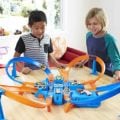When it comes to engaging kids in STEM concepts, ping pong balls — flying through the air at unpredictable speeds — can be an excellent place to start.
That appears to be the case, at least, at The Works Museum in Bloomington, which offers a diverse array of educational summer day camps for ages 4 to 12.
Here engineering and design concepts aren’t so much taught as they are discovered through projects that encourage imagination, discovery and, when needed, the copious use of airborne ping pong balls.
Trial and error
This coming summer’s pre-K half-day camp offerings include Make It Float, Make It Sink!, Make It Go!, and Make It Super Powered!
During the latter camp last summer, preschoolers created their own catapults and sling shots to shoot ping pong balls across the room.
Supplies included pieces of wood, plastic spools, cardboard tubes, rubber bands and tape. Instruction included a talk about fulcrums and levers.
Kids, scattered around the room and reaching varying degrees of success, released shouts of “Boom!” “Whoa!” and “Mine really works!”
Instructor Suzanne Bailey walked around the room to check on the kids, but made sure not to say anything was wrong with the students’ projects. Instead she reminded them of all the supplies they had at their disposal and offered open-ended suggestions such as trying different sizes of rubber bands.
“We’re not done,” Bailey said. “We’re just starting to test.”
One 5-year-old camper named Nicholas was crouched on the ground, trying to wrangle a rubber band around a piece of wood and a plastic fulcrum. It was the birth of what he would later call his very own “turning sling shot,” due to his invention’s wind-up action just before launch.
“It’s very fun making stuff,” Nicholas said.
Open-ended learning
Make It Super Powered! campers weren’t exactly doing calculations or drawing blue prints, but they were using trial and error to discover what made their ping pong balls fly different distances.
“Flying” was just one of many super powers campers explored during the half-day camp, which tackled the mechanical concepts of cranes, levers, wheels, axles and more.
Campers learned by creating and building, but also by playing.
At one point, the Make It Super Powered! campers played a game in which instructors launched ping pong balls from a large catapult and then had the kids try to “catch” them with hula hoops, which resulted in laughter and shouts of glee.
Kit Wilhite, the museum’s senior director of learning experiences, said instructors don’t tell the kids how to solve design problems at The Works.
“It’s very open ended,” she said. “They’ll experience something, and then we’ll talk about it.”
Coding, construction and beyond
It’s not just preschoolers who can get in on the fun of summer camp at The Works.
Camps that cater to ages 6 to 8 include construction, carpentry, LEGO engineering, toy design, computer coding and robotics, to name a few.
Ball Runs and Crazy Contraptions — which encourages kids to create roller coasters inspired by a K’Nex ball machine — is geared toward ages 6 to 8. Slingshots and Hydroli-bots caters to ages 9 to 12 and involves air cannons and water-powered robots.
Special camps just for girls include one called Rosie Revere, Engineer, inspired by the female inventors featured in Andrea Beaty’s best-selling book. Another, Robocoding for Girls, includes the use of WeDo 2.0 robotics pieces from LEGO.
For the 9-to-12 set, many of the camps are built around computer-coding activities, including Code Camp 1 and Code Camp Level Up for more experienced coders, plus Code Camp 1 For Girls.
Last summer, an 11-year-old girl named Cassidy worked on coding her own bridge in the videogame Minecraft using coding software known as RaspberryPi.
“When I first learned coding, it was really hard and confusing,” she said, reflecting on her first two days in the class.
On her third day, she was feeling better: “As you keep going, it makes more sense.”
The Works offers camps with artistic elements, too, with titles such as Origami Engineering and Architecture: Houses. Last summer, for a camp called Artistry in Motion, campers created their own spin-art machines.
Process, not theory
Since 1995, The Works’ official mission has been to raise the next generation of creative problem solvers, whether the problems they face are in the STEM field, in the design industry or in something far different.
“Some parents say, ‘My child doesn’t like engineering,’” said Sarah Curtis, The Works’ director of marketing and communications. “But their kids do. They just don’t understand that building, inventing, designing and creating are all part of engineering.”
Instructors at The Works don’t emphasize theory, but rather the process of learning. With backgrounds in fields such as electrical engineering, early childhood education, science education and art, they carry forward the museum’s view of what engineering is — the process of learning how to overcome failure to make the world work better.
Bailey — while debriefing the Make It Super Powered! preschoolers on a project last summer — drove home that philosophy: “If it doesn’t work, what are you going to do?”
And the voices of 12 eager preschoolers yelled back, “Fix it!”
Lianna Matt is a Twin Cities journalist who loves traveling and meeting people on the job — even if she is a bit directionally challenged.
The Works
Kids learn about engineering and design through hands-on projects and challenges using building materials, construction toys, robotics components and computers at this interactive children’s museum.
Ages: 4–12. (Preschoolers must be going into kindergarten or High Five in fall 2017 to attend camp).
Dates: June 12–Aug. 31. Camps run Monday–Thursday with Friday Fun Days available as optional add-on days for ages 6 and older.
Hours: Morning and afternoon camps can be combined for ages 6 and older for a full day of camp (with supervised lunch). Drop-off begins at 8:30 a.m. for morning camps. Pick up ends at 4:15 p.m. for afternoon camps. Aftercare is available until 5 p.m. for $7 a day.
Location: Bloomington
Weekly cost: $160–$185 per four-day week of camp; Friday Fun Days cost $80 each.
Info: theworks.org
















